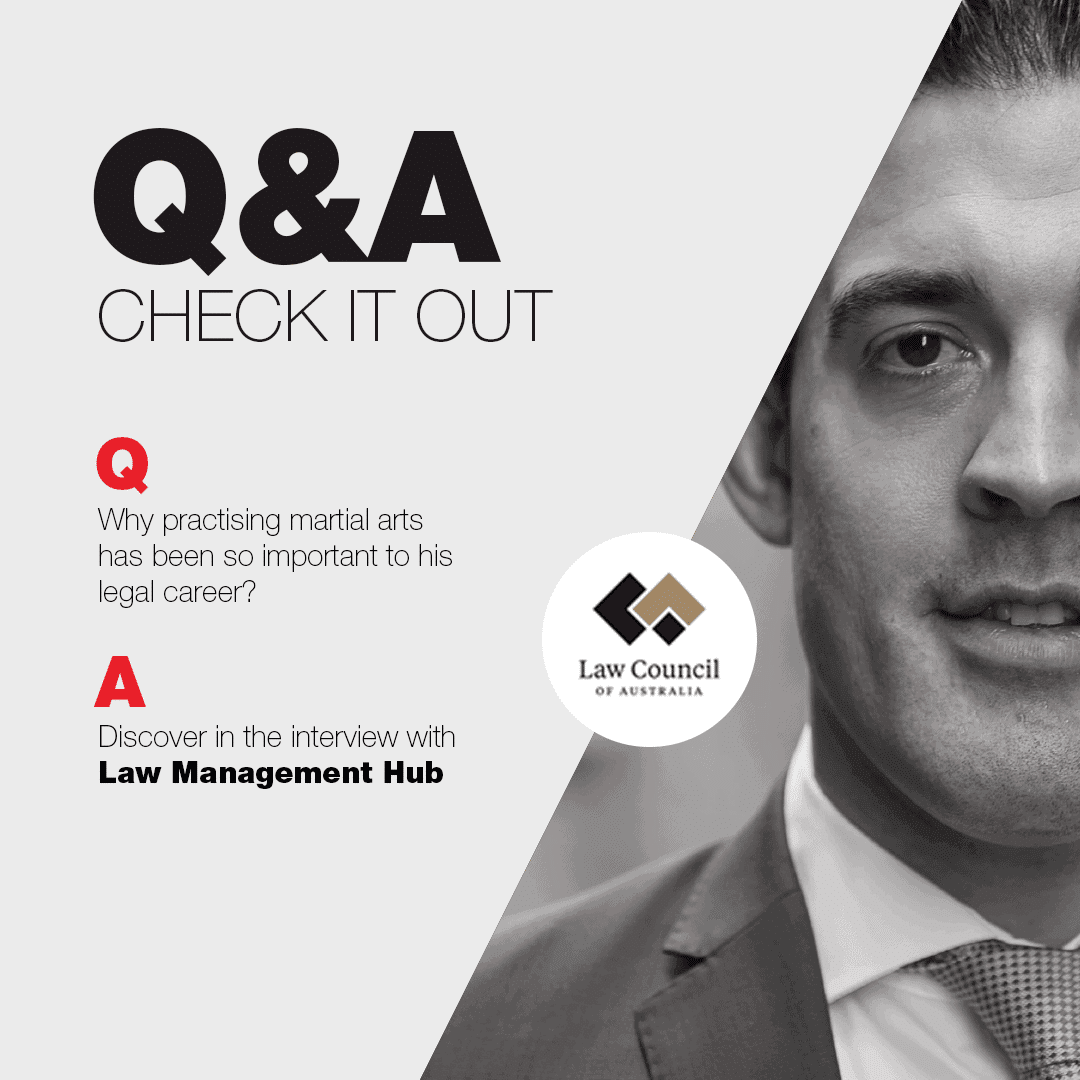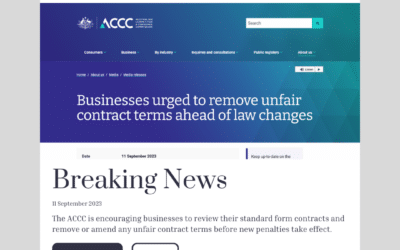
The Law Management Hub
The scene: About July 23, our principal Matthew Karakoulakis was invited to be part of one of the sections Q&A with successful law firm leaders and managing partners by Australasian Law Management Journal, an online publication produced for the Law Council of Australia.
In this edition of the Australasian Law Management Journal, the all-important issue of pricing is front and centre. Highly regarded consultant Colin Jasper explains why lowering fees during a downturn can be the start of a downward slide, while small firm specialist Rob Knowsley discusses the requisite skills and psychology for smart fee-setting. Meanwhile, in the world of HR, Leonie Green suggests senior management should use the lockdown period during COVID-19 to rethink their leadership approach. In our Q&A, AMK Law founder Matthew Karakoulakis tells us how martial arts has made him a better lawyer.
In the first part of a two-part Q&A, our founder Matthew Karakoulakis explains why practising martial arts has been so important to his legal career, and how innovation is helping our clients.
Below are the questions posed by The Law Management Hub and Matthew’s thoughts.
Why did you choose law as a career?
“I grew up in Adelaide and knew from about the age of 10 that I wanted to be a lawyer. I remember walking down the street with my Mum and Dad and telling them there were three things I really wanted to achieve in my life. One was to be a really successful lawyer, the second was to get a black belt in karate, and the third was to play football for the Port Adelaide Magpies in the South Australian local league. As it has turned out, I have been lucky to get into law and I’m also very much into martial arts. I was really drawn to law early in my life because I saw lawyers as being able to influence outcomes and achieve fairness and justice for people.”
That’s a very young age to decide on a career path?
“Yes. I don’t think I could have really understood at that stage what a lawyer does, but there was something in my heart that gave me clarity. Even though I didn’t know about the day-to-day tasks of the role, I knew about the element of justice and that’s what’s driven me in my career.”
Over the years you have worked for ASIC and top-tier firms such as Clayton Utz and HWL Ebsworth, and you now run AMK Law, a boutique commercial litigation law firm. Has the law lived up to your expectations?
“The law is so vital for the functioning of our society. If you look at a current example in terms of the COVID-19 pandemic, one of the first things that unfolded was around laws being passed for businesses to close down and advice as to what people and businesses could and couldn’t do. So, in terms of being able to influence and assist others, it has definitely lived up to my expectations as a career. The other great thing has been running AMK Law for the past 6½ years. We’ve had ups and downs and made mistakes, learnt lessons, but overall it’s been a fantastic journey and I’ve loved being involved in the firm’s growth and having a direct influence on people’s lives.”
Are there any aspects of the law that are dispiriting?
“One of the biggest disappointments I have experienced, as a litigator, is that the court process can be so reactive. Sometimes, if a wrong has occurred, it can take two to three years to achieve justice for a client. The other negative can be the cost of legal processes. If I want to represent a client with all the bells and whistles, but I’m up against an international corporation or a top-10 listed ASX company with unlimited financial capabilities, it can be very difficult because I have to bear in mind costs and I may not be able to go through the full force of the law. You can run out of funds, or you may be forced into a settlement. So, those two factors are among the challenges for the profession.”
Is there a way around such problems?
“I’ve been lucky to have some great mentors, and none better than recently retired QC Frances O’Brien. She has the highest level of integrity and has taught me a lot about litigation. She commented to me on the way to a hearing one day: ‘Yes, Matthew, there are down sides in our legal system, but there’s much worse around the world and we are very lucky to have the system we do. That’s something I always keep in the back of my mind. Nevertheless, when running cases she would always try to bring cases to the lower jurisdiction if possible. She would prefer the County Court to the Supreme Court, for example, to cut costs. With her correspondence, she would also try to keep legal letters to a page if she had two or three points to make, whereas time and time again you see some lawyers draw out letters to six, seven or eight pages. You have to remember that with litigation most of those letters end up before a judge who has to read hundreds or thousands of pages of documents. If you’ve got one letter that is summarised nicely, it can have more impact and it’s more cost-effective, depending on the situation.”
With regard to martial arts, have you got your black belt?
“No yet, but it’s still one of my goals. I have a brown belt in Brazilian jiu jitsu and my journey in martial arts has helped me immensely in the practice of law. Martial arts is all about process and if you are with an opponent and you can follow your process, you’re more likely to achieve victory – and the same applies to putting a commercial deal together, or running a litigation matter. If you can be clear about your process and control the events, you’re likely to get the outcome you want. Another aspect of martial arts is hard work. In addition to having excellent jiu jitsu ability, my coach has a brilliant work ethic and trains harder and longer than others. Likewise, in a legal sense if you want to be a great lawyer and build a great team, it really comes down to hard work behind the scenes when no one is looking to do the hard yards and put your head down and bum up to take care of your staff and clients.”
What about the mental side – does the discipline of jiu jitsu help there, too?
“Well, lawyers can sometime feel the stress and pressure that comes with the day-to-day components of the law, and it’s even more so in the litigation space where the stress levels of your clients are often even greater. Think about martial arts, where you may have a 140kg person sitting on you and suffocating you, and you need to be able to breathe and hold your composure to come out the other side. So, having the mental capacity to handle the pressure and look for solutions are other factors that can help when practising law.”
You have been named as a finalist in the Australian Law Awards for the Sole Practitioner of the Year category, and AMK Law has been named one of the nation’s most innovative firms in the Australasian Lawyers Awards for 2020. Tell us about the mindset of being innovative.
“From the beginning at AMK Law, we always knew that innovation would be an absolute key to providing the efficiency and collaboration that is needed to deliver the quality of legal services that our clients desire. Mindset is certainly a massive part of what innovation is all about. There are plenty of really good lawyers who can read the black and white elements of the law, but we need to remember that it is our professional responsibility to empower our clients’ legal position. If you consider what your clients really need, rather than offering a cookie-cutter model, that is the starting point. Then you need to understand their drivers and have solutions in place that can efficiently and effectively achieve the results they expect. Look at things through the client’s lens, rather than your own lens, so you can deliver great value and the results your clients deserve.”
Part of AMK Law’s innovative approach involves using the latest technologies to deliver legal services, including Action Step (a cloud-based legal management software that helps manage the trust account), Calendly (for online appointment scheduling), Asana (for team planning), Pipedrive (for managing the firm’s leads) and Autom.io (for drafting legal documents). Where does technology fit in?
“We also use platforms such as Boost Legal templates that offer affordable and automated products which are tailored to assist our Indigenous clients and community. For marketing purposes and engaging with clients, we use technology software such as independent reviews site FirmChecker as a way to better reach, engage and service our customers. We also encourage organic growth through Google reviews because it encourages transparency, insofar as clients are able to see the quality service provided by my team. We take pride in our reviews and see them as a way for clients to see who we are and what we stand for. I also like to do videos to tell clients about our values and share stories about our day-to-day activities so they can get a sense of who we are as a firm. One thing I realised early in the piece is that most clients really don’t want to go and see their lawyer, even though law firms often spend a lot of money renting the flashest building available in the CBD, rather than the building next to the local fish and chip shop. All clients really want is to be able to trust their lawyer. So, through using technology and having an online presence, we can show clients who we are. This gives clients an insight into the way we work, our culture and helps our clients see if they are a good fit for us. Our online presence also serves as a means to send out the right message about what we do and helps as a part of the qualifying process which is undertaken before any new clients are taken on board.”
So videos can be important, rather than just writing blogs or creating other website marketing material?
“Yes, the key is just to get content up. Lawyers, especially, with their attitude of perfection, often only want to produce a Hollywood-type video where they look like Brad Pitt, but clients really just want to know who you are, whether you can assist them with their legal matter, and if you’re a person they feel comfortable with. Part of that is showing them who you really are. So, I’ve got some public postings and stories, including one with my dog snoring in the middle of a mediation. It shows a personal side and it breaks down barriers with clients who may see lawyers as having this sacred and secret piece of legal knowledge that only a few can acquire. The truth is that the law, when it’s practised by an excellent lawyer, is very easy to follow and understand, and part of a good lawyer’s role is to simplify the legal process. Taking advantage of innovation and technology can be a key to such simplification.”
How else can you stay connected and in touch as a firm?
“Last year we moved into a co-working space in Collins Street where we share a floor with other businesses. When we made that shift I wondered about having my own office, but I decided to work in an open-plan area where team members can work collaboratively and also be in the mix with other businesses. That has been a positive move in terms of being physically among other businesses and hearing what they are doing and need. We have the chance to embrace other business cultures and the strengths from other industries that can be brought into the legal profession, and that helps us deliver better legal services.”
Important disclaimer: The material contained in this publication is of a general nature only and it is not, nor is intended to be legal advice. This publication is based on the law as it was prior to the date of your reading of it. If you wish to take any action based on the content of this publication, we recommend that you seek professional legal advice.

Book Your Appointment
Related Articles
Privilege Under Pressure: Insights from the Optus Case
A Shifting Legal Landscape Today's businesses are under constant threat from cyber attacks, making it increasingly important to understand how they can legally protect their private conversations. Legal professional privilege is a fundamental rule that keeps the...
Ticketek’s $500K Fine: A Legal Perspective on Email Compliance
In the constantly changing world of digital communication, email marketing remains a vital way for businesses to connect with their audience. However, it's crucial to manage this tool with care and attention to legal obligations. The Australian Communications and...
Navigating the Waters of Unfair Contract Terms in Australia
As a small business owner in Australia, you might have come across the recent updates to the Australian Consumer Law regarding unfair contract terms. If it seems a bit complex, don't worry! We're here to simplify it for you in clear terms. Unfair Contract...




